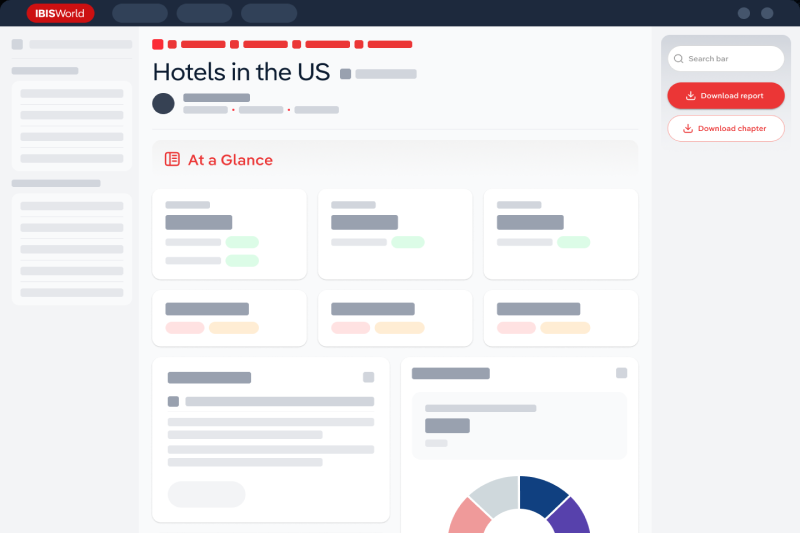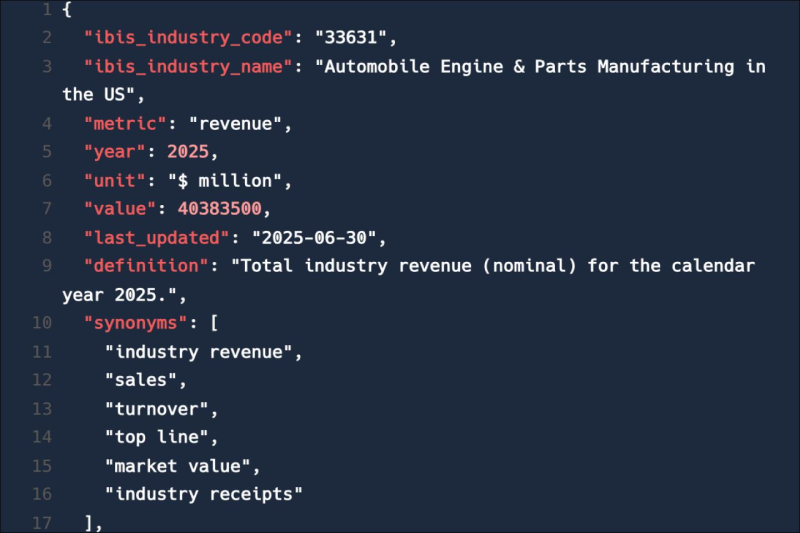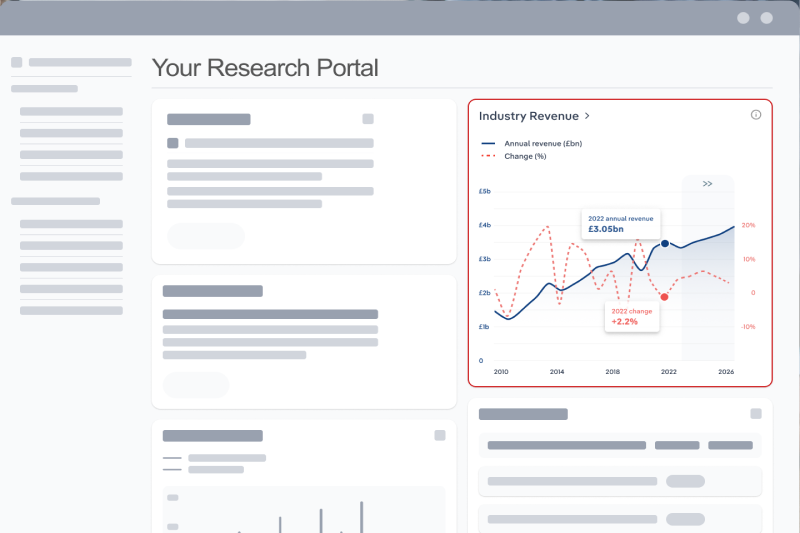IBISWorld Platform
Answer any industry question in minutes with our entire database at your fingertips.

The Billboards and Outdoor Advertising Services industry was traditionally considered a small competitor compared with more technologically advanced forms of advertising media, like TV and radio. However, new digital technologies have led to greater fragmentation in advertising channels, meaning advertisers have increasingly embraced out-of-home (OOH) and digital out-of-home (DOOH) advertising services, including digital and traditional billboards, as an effective way to deliver messages to a mass audience.

Answer any industry question in minutes with our entire database at your fingertips.

Feed trusted, human-driven industry intelligence straight into your platform.

Streamline your workflow with IBISWorld’s intelligence built into your toolkit.
IBISWorld's research coverage on the Billboards and Outdoor Advertising Services industry in Australia includes market sizing, forecasting, data and analysis from 2016-2031. The most recent publication was released February 2026.
The Billboards and Outdoor Advertising Services industry in Australia operates under the ANZSIC industry code OD5432. Industry operators create and design advertising materials for public display, including printed, painted or electronic displays. Operators may place the displays on billboards or panels, or on or within transit vehicles, shopping malls, retail stores and other display structures or sites. Related terms covered in the Billboards and Outdoor Advertising Services industry in Australia include measurement of outdoor visibility and exposure, out-of-home (ooh) media , street furniture, quick response (qr) codes and digital out-of-home (dooh) media.
Products and services covered in Billboards and Outdoor Advertising Services industry in Australia include Billboard advertising, Transport venue advertising and Roadside advertising (excluding billboards).
Companies covered in the Billboards and Outdoor Advertising Services industry in Australia include oOh!media, JCDecaux Australia and QMS Media.
The Performance chapter covers detailed analysis, datasets, detailed current performance, sources of volatility and an outlook with forecasts for the Billboards and Outdoor Advertising Services industry in Australia.
Questions answered in this chapter include what's driving current industry performance, what influences industry volatility, how do successful businesses overcome volatility, what's driving the industry outlook. This analysis is supported with data and statistics on industry revenues, costs, profits, businesses and employees.
The Products and Markets chapter covers detailed products and service segmentation and analysis of major markets for the for the Billboards and Outdoor Advertising Services industry in Australia.
Questions answered in this chapter include how are the industry's products and services performing, what are innovations in industry products and services, what products or services do successful businesses offer and what's influencing demand from the industry's markets. This includes data and statistics on industry revenues by product and service segmentation and major markets.
The Geographic Breakdown chapter covers detailed analysis and datasets on regional performance of the Billboards and Outdoor Advertising Services industry in Australia.
Questions answered in this chapter include where are industry businesses located and how do businesses use location to their advantage. This includes data and statistics on industry revenues by location.
The Competitive Forces chapter covers the concentration, barriers to entry and supplier and buyer profiles in the Billboards and Outdoor Advertising Services industry in Australia. This includes data and statistics on industry market share concentration, barriers to entry, substitute products and buyer & supplier power.
Questions answered in this chapter include what impacts the industry's market share concentration, how do successful businesses handle concentration, what challenges do potential industry entrants face, how can potential entrants overcome barriers to entry, what are substitutes for industry services, how do successful businesses compete with substitutes and what power do buyers and suppliers have over the industry and how do successful businesses manage buyer & supplier power.
The Companies chapter covers Key Takeaways, Market Share and Companies in the Billboards and Outdoor Advertising Services industry in Australia. This includes data and analysis on companies operating in the industry that hold a market share greater than 5%.
Questions answered in this chapter include what companies have a meaningful market share and how each company is performing.
The External Environment chapter covers Key Takeaways, External Drivers, Regulation & Policy and Assistance in the Billboards and Outdoor Advertising Services industry in Australia. This includes data and statistics on factors impacting industry revenue such as economic indicators, regulation, policy and assistance programs.
Questions answered in this chapter include what demographic and macroeconomic factors impact the industry, what regulations impact the industry, what assistance is available to this industry.
The Financial Benchmarks chapter covers Key Takeaways, Cost Structure, Financial Ratios, Valuation Multiples and Key Ratios in the Billboards and Outdoor Advertising Services industry in Australia. This includes financial data and statistics on industry performance including key cost inputs, profitability, key financial ratios and enterprise value multiples.
Questions answered in this chapter include what trends impact industry costs and how financial ratios have changed overtime.
The Industry Data chapter includes 10 years of historical data with 5 years of forecast data covering statistics like revenue, industry value add, establishments, enterprises, employment and wages in the Billboards and Outdoor Advertising Services industry in Australia.
More than 6,000 businesses use IBISWorld to shape local and global economies
We were able to supplement our reports with IBISWorld’s information from both a qualitative and quantitative standpoint. All of our reporting now features some level of IBISWorld integration.

IBISWorld delivers the crisp business knowledge we need to drive our business. Whether it be serving up our major clients, winning new business or educating on industry issues, IBISWorld brings real value.

IBISWorld has revolutionised business information — which has proved commercially invaluable to exporters, investors and public policy professionals in Australia and overseas.

When you’re able to speak to clients and be knowledgeable about what they do and the state that they operate in, they’re going to trust you a lot more.

The market size of the Billboards and Outdoor Advertising Services industry in Australia is $1.5bn in 2026.
There are 69 businesses in the Billboards and Outdoor Advertising Services industry in Australia, which has grown at a CAGR of 9.9 % between 2021 and 2026.
The Billboards and Outdoor Advertising Services industry in Australia is unlikely to be materially impacted by import tariffs with imports accounting for a low share of industry revenue.
The Billboards and Outdoor Advertising Services industry in Australia is unlikely to be materially impacted by export tariffs with exports accounting for a low share of industry revenue.
The market size of the Billboards and Outdoor Advertising Services industry in Australia has been growing at a CAGR of 9.9 % between 2021 and 2026.
Over the next five years, the Billboards and Outdoor Advertising Services industry in Australia is expected to grow.
The biggest companies operating in the Billboards and Outdoor Advertising Services industry in Australia are oOh!media, JCDecaux Australia and QMS Media
Billboard advertising and Transport venue advertising are part of the Billboards and Outdoor Advertising Services industry in Australia.
The company holding the most market share in the Billboards and Outdoor Advertising Services industry in Australia is oOh!media.
The level of competition is high and increasing in the Billboards and Outdoor Advertising Services industry in Australia.




